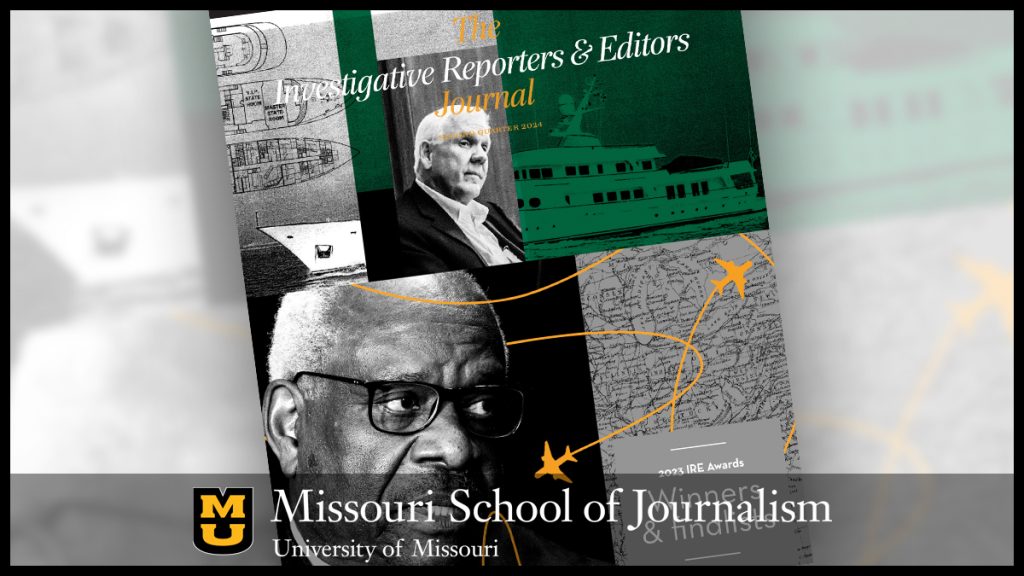IRE re-launches podcast with Missouri School of Journalism grad student as host

COLUMBIA, Mo. (June 5, 2024) — Investigative Reporters and Editors (IRE), a nonprofit organization based at the Missouri School of Journalism that helps journalists train and collaborate, has re-launched its podcast after a four-year hiatus.
Hosted by Nakylah Carter, a graduate student at the School of Journalism, the IRE Radio Podcast delves into the stories behind notable reporting projects and the people who make them possible. Three new episodes are available now.
“This podcast is one more avenue through which we can help to foster excellence in investigative journalism,” said Doug Meigs, BJ ’07, editorial director of IRE. “The lessons that can be learned from these episodes will benefit journalists at any level in their career, from executives down to an entry-level general assignment reporter.”
The first three episodes are drawn from elements of the quarterly IRE Journal, featuring an eclectic mix of practical tips, behind-the-scenes glimpses into large-scale, long-term reporting and highlighting those who have made important contributions to the field and to journalism education.
In “Finding stories on the education beat,” panelists from IRE’s 2023 AccessFest conference share insights and advice they have gleaned from decades covering education and teaching the next generation of reporters.
“A look inside Uvalde: 365” features an insider look at a year-long ABC News project documenting the impacts and aftermath of a mass shooting at a Uvalde, Texas, elementary school in 2022. Cindy Galli, an IRE board member and the executive producer who led the project, delves into how the project helped change the way the industry reports on mass tragedies.
Finally, in “The legacy of Philip Meyer,” Carter profiles data reporting pioneer Philip Meyer with the help of recordings from the 2023 and 2024 NICAR (National Institute for Computer-Assisted Reporting) conferences. Meyer died last November, shortly after his trailblazing book fusing scientific research into reporting methods, “Precision Journalism,” reached its 50th anniversary. He is also the namesake of IRE’s Philip Meyer Journalism Award.
This podcast is one more avenue through which we can help to foster excellence in investigative journalism. The lessons that can be learned from these episodes will benefit journalists at any level in their career, from executives down to an entry-level general assignment reporter.
Doug Meigs, editorial director of IRE
At the core of these episodes is host Carter, who came highly recommended by Professor David Herzog — academic adviser to NICAR — after she took Herzog’s data reporting course.
“Nakylah has just been a phenomenal contribution,” Meigs said. “She is a very versatile writer and has a great on-air presence. She can do it all.”
Carter — yet another successful graduate student who came to Mizzou after earning her undergraduate degree from North Carolina A&T, the largest public HBCU in the country — is not new to podcasting. She independently produced her own podcast during her sophomore year at A&T, which included conducting her own interviews and creating graphics.
That experience was largely self-taught. The more important foundational knowledge, she argues, came from working with reporter and producer Rebecca Smith at KBIA-FM, the Missouri News Network’s NPR-member station. Carter adapted her own front-page story for community newspaper the Columbia Missourian, also part of the School’s professional Missouri News Network, into an audio story that allowed her to draw out aspects of the narrative she wanted to explore more deeply.
“Recording, editing the audio, producing — everything I did for the IRE Podcast came from my week of radio,” Carter said. “Even though that was a really small time in the semester, I took everything I learned from that and put it right into the podcast.”
Carter is studying data and investigative journalism at the School of Journalism and plans to complete her master’s degree next May. She and Meigs plan to continue producing podcast episodes in tandem with the quarterly release of the IRE Journal alongside Carter’s additional responsibilities, such as writing for the journal and putting together a newsletter that shares case studies and other relevant information with broadcast journalists.
Over the summer break, Carter is also working as a data fellow at The Marshall Project. The fellowship is part of the 2024 Dow Jones News Fund, which allowed her and other interns to attend a weeklong bootcamp hosted by IRE at the School of Journalism.
For Carter, it’s all about learning as much as she can and sharing that knowledge with the public.
“I always think it’s nice to know not only tips and tricks, but why we report — why it was necessary in the past and why it’s necessary now,” Carter said. “That’s great as a listener, but even me as a producer, I’ve learned so much from these episodes. I’m very grateful to have been given this opportunity.”
The IRE Podcast is available on Spotify, Apple Music, Amazon Music and SoundCloud.
Updated: June 5, 2024
